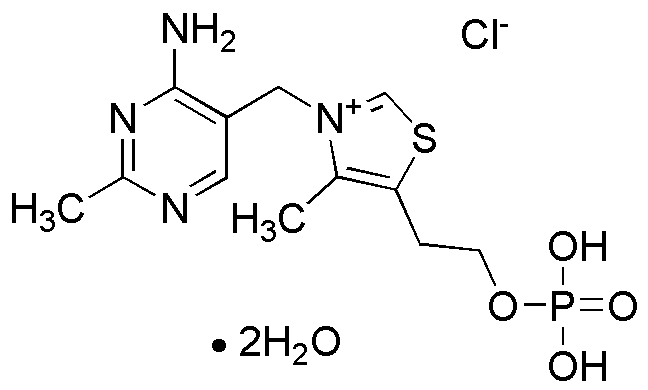Thiamine monophosphate chloride dihydrate is widely utilized in research focused on:
- Nutrition and Dietary Supplements: This compound serves as a vital source of thiamine (Vitamin B1), essential for energy metabolism. It is commonly found in dietary supplements aimed at preventing deficiencies, particularly in populations at risk.
- Pharmaceutical Formulations: It is incorporated into various pharmaceutical products to enhance the therapeutic effects of medications, especially those targeting metabolic disorders, thereby improving patient outcomes.
- Animal Feed Additives: The compound is used in animal nutrition to promote growth and improve feed efficiency, ensuring livestock receive adequate vitamins for optimal health and productivity.
- Research in Biochemistry: Researchers utilize thiamine monophosphate chloride dihydrate in studies related to enzyme activity and metabolic pathways, providing insights into cellular processes and potential therapeutic targets.
- Cosmetic Products: Its antioxidant properties make it a valuable ingredient in skincare formulations, helping to protect skin cells from oxidative stress and promoting overall skin health.
General Information
Properties
Safety and Regulations
Applications
Thiamine monophosphate chloride dihydrate is widely utilized in research focused on:
- Nutrition and Dietary Supplements: This compound serves as a vital source of thiamine (Vitamin B1), essential for energy metabolism. It is commonly found in dietary supplements aimed at preventing deficiencies, particularly in populations at risk.
- Pharmaceutical Formulations: It is incorporated into various pharmaceutical products to enhance the therapeutic effects of medications, especially those targeting metabolic disorders, thereby improving patient outcomes.
- Animal Feed Additives: The compound is used in animal nutrition to promote growth and improve feed efficiency, ensuring livestock receive adequate vitamins for optimal health and productivity.
- Research in Biochemistry: Researchers utilize thiamine monophosphate chloride dihydrate in studies related to enzyme activity and metabolic pathways, providing insights into cellular processes and potential therapeutic targets.
- Cosmetic Products: Its antioxidant properties make it a valuable ingredient in skincare formulations, helping to protect skin cells from oxidative stress and promoting overall skin health.
Documents
Safety Data Sheets (SDS)
The SDS provides comprehensive safety information on handling, storage, and disposal of the product.
Product Specification (PS)
The PS provides a comprehensive breakdown of the product’s properties, including chemical composition, physical state, purity, and storage requirements. It also details acceptable quality ranges and the product's intended applications.
Certificates of Analysis (COA)
Search for Certificates of Analysis (COA) by entering the products Lot Number. Lot and Batch Numbers can be found on a product’s label following the words ‘Lot’ or ‘Batch’.
*Catalog Number
*Lot Number
Certificates Of Origin (COO)
This COO confirms the country where the product was manufactured, and also details the materials and components used in it and whether it is derived from natural, synthetic, or other specific sources. This certificate may be required for customs, trade, and regulatory compliance.
*Catalog Number
*Lot Number
Safety Data Sheets (SDS)
The SDS provides comprehensive safety information on handling, storage, and disposal of the product.
DownloadProduct Specification (PS)
The PS provides a comprehensive breakdown of the product’s properties, including chemical composition, physical state, purity, and storage requirements. It also details acceptable quality ranges and the product's intended applications.
DownloadCertificates of Analysis (COA)
Search for Certificates of Analysis (COA) by entering the products Lot Number. Lot and Batch Numbers can be found on a product’s label following the words ‘Lot’ or ‘Batch’.
*Catalog Number
*Lot Number
Certificates Of Origin (COO)
This COO confirms the country where the product was manufactured, and also details the materials and components used in it and whether it is derived from natural, synthetic, or other specific sources. This certificate may be required for customs, trade, and regulatory compliance.


